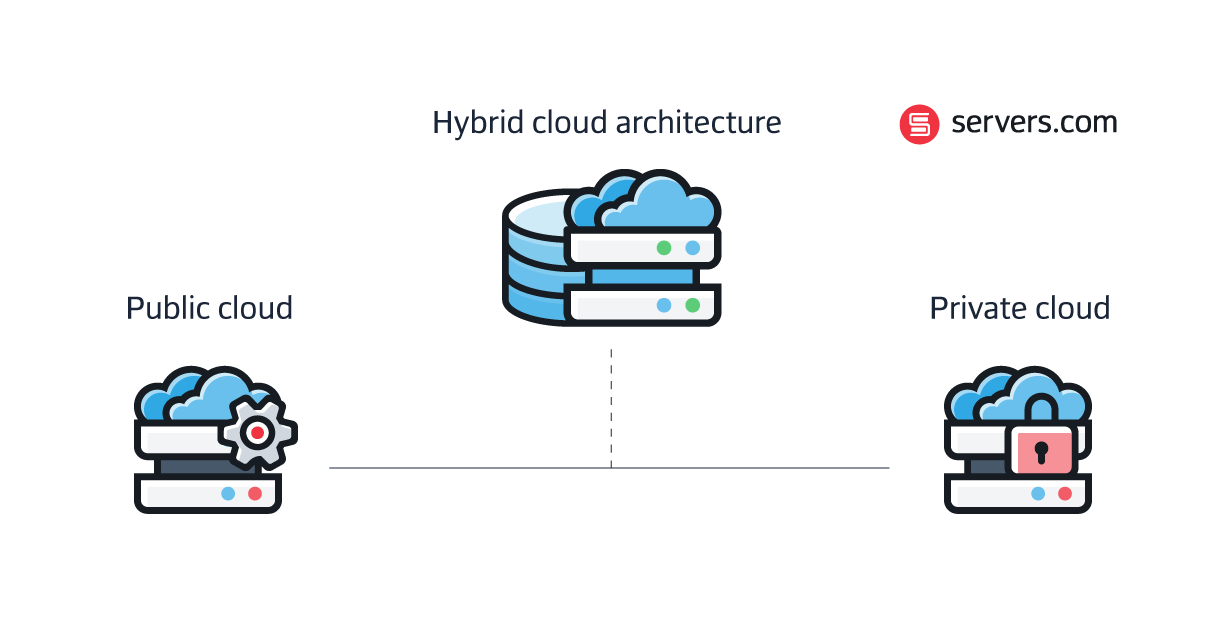

Since the exponential growth in cloud computing in recent years, cloud technology and its use cases have continued to grow and evolve. But what kind of cloud computing is best?
We’ve previously explored the benefits of bare metal dedicated servers and looked at the differences between public and private cloud, but a third solution is gaining popularity - hybrid cloud computing.
Promising the benefits of private cloud, public cloud, and bare-metal, hybrid cloud environments allow you to choose a combination that works exactly with your requirements. And the market for it is growing. The global hybrid cloud market size is valued at $129 billion in 2024 and is expected to exceed $352 billion by 2029.
If you’re considering hybrid cloud solutions but want to avoid common infrastructure hosting mistakes this blog covers the essentials including: what constitutes hybrid cloud computing, private cloud vs public cloud, and the benefits and drawbacks for each solution.
Hybrid cloud is a type of hybrid infrastructure that runs applications on a combination of different cloud environments with orchestration between the different solutions. Typically, this involves a combination of on-prem, private, and public cloud services.

In a public cloud computing environment, the cloud infrastructure is owned and managed by the cloud provider and delivered to customers over the internet. Public clouds are multi-tenant solutions - customers share the underlying physical servers (e.g. hardware, storage, network devices) but rent their own virtual machine, allowing them to manage their operating system independently of other customers.
No upfront costs – the cloud provider fronts the cost of the physical hardware
Pay-as-you-go billing – reduces the risk of over or under-provisioning
Built-in reliability - virtual machines can be moved to spare hardware in the event of maintenance or downtime.
Reduced control over security – due to operating in a shared hosting environment
Reduced performance – due to sharing resources with other users
High operational expenditure – particularly for large-scale workloads
Private cloud environments are dedicated entirely to a single tenant. A private cloud’s infrastructure and services are always within a private network, and the resources within it are used only by your business. This should not be confused with a VPC (virtual private cloud) which is a private cloud environment within a public cloud.
More customization – because resources aren’t shared between tenants you can tailor the specifications to your requirements
Improved security – because resources aren’t shared with other tenants, private cloud environments offer higher levels of security
Limited cost savings for small businesses – you’ll need a large workload to benefit from the economies of scale that come with renting private cloud infrastructure
Scalability – whilst private cloud environments are scalable, you won’t get the auto-scaling capabilities of public cloud that allow you to track resource demand and scale up and down accordingly
In a hybrid cloud architecture, you can take advantage of different computing environments simultaneously, making the most of the benefits that each type of hosting offers.
For instance, if part of your application stack requires multiple physical servers but rarely scales, bare metal servers would be the most cost effective. If another set of systems require incredible fault tolerance and security but not particular scale, private cloud with disaster recovery features is your winner. In addition, you might experience seasonal peaks that cause traffic spikes, which would be best suited to public cloud’s instant scalability.
In this scenario, a hybrid cloud solution featuring bare metal, private, and public cloud would be the most effective way to split your workloads.
Cost-efficiency - with a hybrid cloud approach you can save on costs by allocating resources for short-term projects to a public cloud rather than your on-prem data center or private cloud
Compliance - some highly-regulated industries, such as iGaming, dictate where an organization’s data should reside and in these cases public cloud may be unsuitable. With hybrid cloud computing, sensitive data can be placed in a private environment, while other workloads (e.g. those requiring instant scalability) can be hosted in a public cloud environment
Built-in flexibility - with hybrid cloud solutions, businesses can assign their computing requirements to the most appropriate environment and unexpected demand increases can be accommodated by speedy public cloud provisioning
Disaster recovery - with hybrid cloud computing, organizations can replicate on-premise data and back this up in the cloud. If there’s any disruption in the data center, failover of workloads to the cloud ensures continuity of service
Easily test and develop new applications - use public cloud as a cost-effective and quick means of developing and testing new applications, without the need to invest in infrastructure on-premises or a private cloud
Complexity - implementing hybrid cloud computing often requires managing multiple suppliers and contracts
Investment - hybrid cloud computing can reduce IT spending and operational costs over time, but it’s still more expensive to implement than a single type of hosting. You’ll also need an IT team with the expertise to maintain a hybrid cloud environment
While not suitable for all sizes and types of organizations, if you’re a large business running multiple applications it’s worth exploring hybrid cloud computing. Provided the potential complexities and upfront investment is manageable, hybrid cloud solutions can offer the best of each different hosting option, improved scalability, and reduced costs over time.

Frances is proficient in taking complex information and turning it into engaging, digestible content that readers can enjoy. Whether it's a detailed report or a point-of-view piece, she loves using language to inform, entertain and provide value to readers.